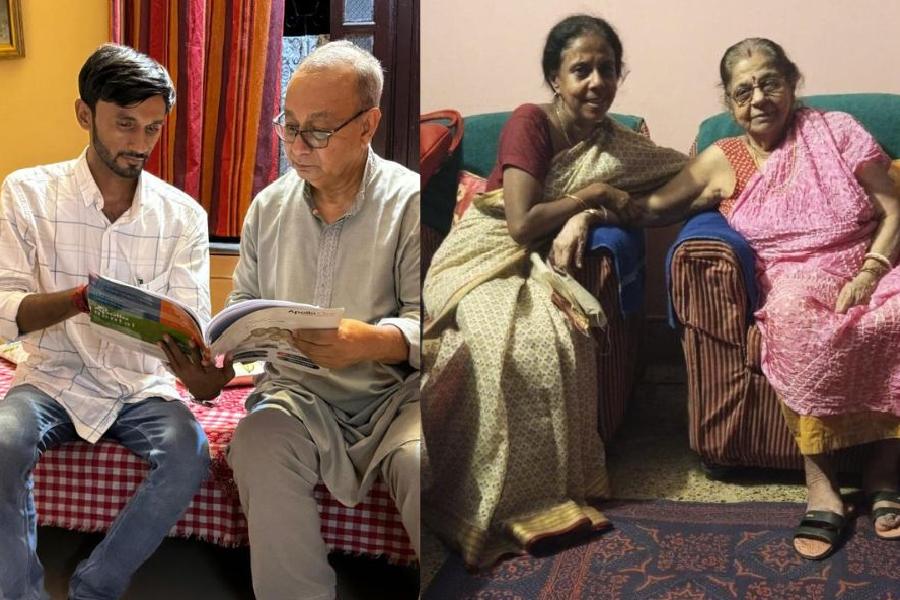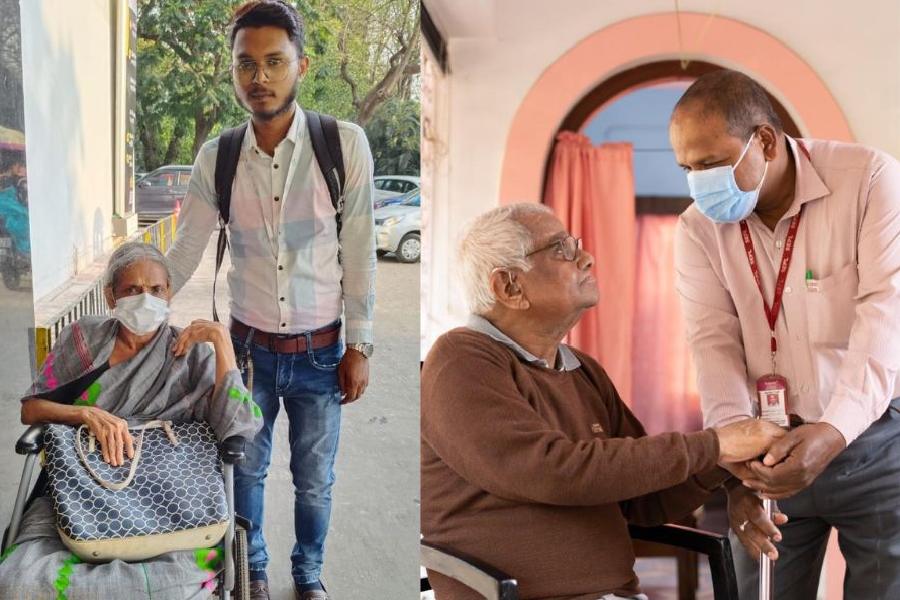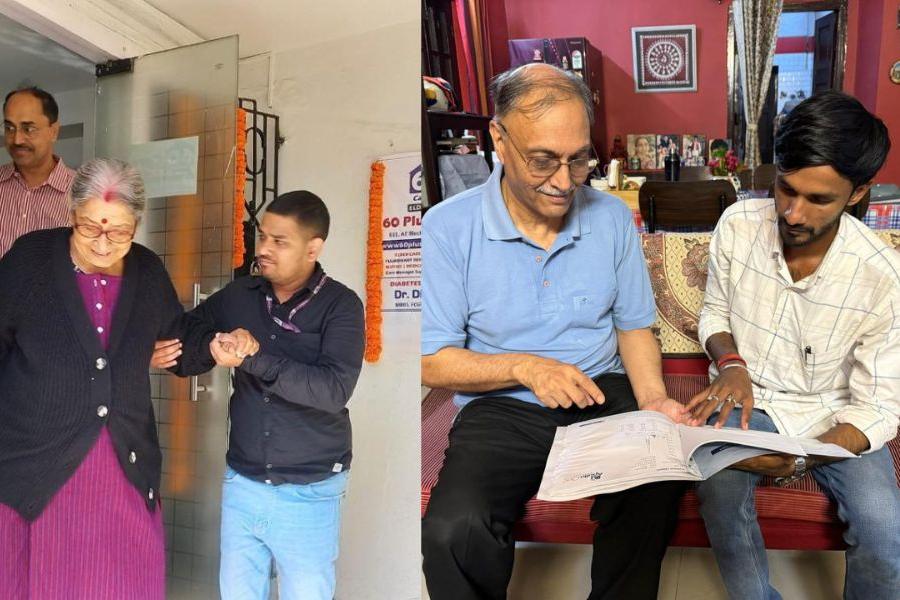The other day, Mithu Pal received a call from her dida, saying she wasn’t feeling well. Mithu quickly took the elderly lady to ILS Hospital, where the doctor advised immediate surgery. The lady transferred the money to Mithu’s account and slipped into anesthesia. When she awoke, her tumour had been removed, and Mithu escorted her back home, the day ending at about 11 pm.
Nothing novel, given how every grandchild would happily help out their didas. Except Mithu isn’t really the lady’s granddaughter; she is her care manager.
It’s no secret that the twin townships have ageing populations, and that the youths have mostly migrated away for better job prospects. Senior citizens now live in mansions, but alone. They think twice before heading to the doctor’s chamber by themselves and doubt if they can stand in queues at banks.

A senior citizen of DA Block is visited by a care manager from Tribeca Care (left); A caregiver from Salt Lake Sayantani Services poses with an elderly client in AE Block
Enter professional agencies that provide care managers. Ayahs are limited in their education and scope of work but these managers are usually graduates or more and hence smart enough to speak to the client’s chartered accountant or doctor, fetch cash from the ATM machine, or lodge FIRs. But most of all, they provide companionship and try to fill the void left by their absent children.
Help at hand
“My sons live in different cities and so I depend on the services of Support Elders,” says Kajal Chanda of BC Block. “The other day my lip started bleeding and would not stop as I take blood-thinning medicines. I called them up and in 10 minutes I was rushed to the emergency room. They have helped many of my friends and relatives too.”
Sitaram Ghosh not only depends on Tribeca Care, but he has a favourite manager there — Debjyoti Chakraborty. “I’ve been in and out of the hospital the last three months,” says the resident of New Town’s CE Block. “My daughter lives in the UK and I don’t want to bother relatives with my problems every time. Debjyoti chhara amader cholei na. Or shonge attityota hoye gyachhe,” he said.
Need of the hour
60 Plus Care & Clinic has been founded by Dipankar Debnath, who is a geriatric medicine specialist, in charge of the department at Techno India Dama hospital. He says every new patient asks the same three questions – “Will you be available over phone, will you be available at night and will you come home?”
“This is why we started the 60 Plus service. Even if the doctor cannot reach the patient’s house at midnight, the care manager can. He then arranges video calls with our in-house doctors,” says Debnath, who has a centre in AE Block.

A Tribeca Care manager taking an FE Block resident to see a doctor (left), A Support Elders care manager attends to an AJ Block resident
While medical needs are the most common, it is not the only issue for the elderly. Arunanshu Ray, founder of a similar service called Avtaarana, cites multiple examples of widows struggling to get the house mutation done after the demise of their husbands. “In one case, an advocate took payment but kept the work pending for three years, certain that her NRI son can never follow up adequately sitting in the US. We did it in three months,” he says.
All in a day’s work
Ask Saibal Dhar of the 60 Plus service what his typical day looks like and he recounts: “I may have two to four visits and buy medicines for a member, fix doctors’ appointment, get some bank work sorted, and then read out to them the newspaper, escort them on an evening walk or take them out for an outing,” says Saibal, who has even enrolled his own parents for the facility.
Most agencies have packages to determine the number of visits a month, besides emergencies. “I have 10 clients under my care so am always on the go. Still, some ladies call unscheduled out of loneliness. They just want to talk so I try to take out 10 minutes for them over the phone,” says Saswati Sen Sharma of Salt Lake Sayantani Services.
Saswati holds a post graduate diploma in social work. “Our members rely on us completely and ask us to do everything they would otherwise ask their children. This one lady calls me for help even when her own son lives upstairs,” she says.
“To lodge an FIR, members may prefer a male caregiver but when they go shopping they specifically ask for me,” says Mithu of 60 Plus. “The didas tell me about their childhood, they take me to their old houses and even to wedding invitations.”
Beyond the call of duty
Given that the elderly see the care managers several times a week, and their own children maybe once a year, they form bonds with them that are almost familial.
One day an elderly lady insisted on seeing Sanjoy Shaw, a volunteer with Saanjhbaati. Unlike the other agencies, this is a free senior citizens’ initiative by Bidhannagar Police Commissionarate, in association with the NGO Offer.
“She would just not say what it was for,” says Sanjoy. “When I finally reached she fed me payesh as it was the birthday of her son, who lives away. I was so moved. Then when I met with an accident, not one but, several members came forward to offer financial help. They did the same when another volunteer Mandakini Ghosh needed a pacemaker.”
At a picnic, a member hand-fed Mithu when she tried to put off her meal. “These members come to the balcony to see me off and remind me to ride my scooty carefully. If it gets later than 10pm, they stay awake till I call and assure them I have reached home safely,” she says.
There is emotion involved in the profession. “Clients are mostly lonely people with few or none to talk to. So they look forward to our weekly visit to check blood pressure. If I am otherwise occupied and send someone else, they call to say they were expecting me,” said Pradip Kumar Guha, who has joined Sector V-based Maitys Elderly Care as care manager three months ago.
Guha still cannot forget a patient he spent a whole day with. “He had cancer of the tongue and came from Chinsurah for chemotherapy. I was with him from early morning as he underwent tests and then the consultation. His chemo session started around 4pm and ended at 8.30pm. I had forgotten my own meal times, such was the day. He was walking on his own and seemed fit. Later, I heard from my colleague in Chinsurah that he passed away within a week.”
Given how visits to relatives and neighbours are becoming things of the past, and the current generation of parents are eager to send their children abroad for studies, Guha expects more loneliness in senior citizens and proliferation of elderly homecare services in future.
Challenging cases
Some are dead-end cases. “Like an elderly woman who gets hit by her son but won’t press charges to protect his reputation. All we can do here is to offer psychological support. Then there are trivial but difficult cases of the neighbour’s dog barking too much or the neighbour’s tree shedding leaves in their yard,” says Kallol Ghosh, secretary of Offer, that runs Saanjhbaati.
Saibal says dementia patients can get non-cooperative. “Today they may ask us to make a doctor’s appointment and tomorrow deny it. We have to tackle such cases with patience and a cool head,” he says.
Mithu has a client who gets depressed and rude if her son does not call her up. “Afterwards she rings me up to apologise for her behaviour,” she smiles.
A client of Ray’s called at midnight once, panicked about some person in his room. “We checked his CCTV feed and found no one. He was hallucinating. We had to calm him down at night and take him to the psychiatrist in the morning,” he recounts.
Arup Dey, who has been a care manager with Tribeca Care for four and half years, remembers a night when he got two back-to-back emergency calls. “I was on my way home towards CIT Road when report came of a client who had fallen at his AD Block home and lost sense. I went and admitted him to AMRI. When I was returning around 1.10am, another call came. An HB Block lady had suffered a heart attack. I turned back and took her to what was then called Columbia Asia Hospital.”
Clients have different preferences and have to be admitted accordingly. “I cannot admit all clients at one hospital if they fall ill simultaneously just to make my job of visiting them daily at the hospital easier. They have to be where their doctor is,” Arup says.
Patience is the key to success in this profession, he points out. “I have had mentally unstable clients abuse me. Some elderly people are so suspicious initially that they refuse to let me in. I simply go and wait at the door for a length of time every day. Gradually they relent,” he says.
The Covid period was a huge challenge for people in the profession. “Taking a patient to hospital meant waiting for three hours or more for the Covid report. If it came positive, some hospitals without isolation wards refused admission. So that meant a trip to another hospital.”
Risk of infection too was high. “It was the night before Kali puja in 2020. A Maniktala client had breathing trouble. Since he had lung cancer, I took that as the trigger and went to him without protection. The next morning his report came positive. Our doctor asked me not to not to worry unless I developed symptoms. I did not,” recalls Arup.
No bed of roses
The care managers also have to deal with situations arising out of actions of the attendants their agencies send or the challenges that the attendants face.
An octogenarian resident of HB Block who used to live with her bed-ridden husband says she had mixed experiences with the series of 24-hour attendants provided by her homecare company over the years.
While some she has had were smart and able to check blood pressure and blood sugar and call the doctor if needed, some others have caused her anxiety and, on one occasion, panic.
“I had gone for a bath but since this woman was acting strange for some days, I came out earlier than usual and peeped into my bedroom. Sure enough, the almirah had been opened and she was rummaging through my things. I knew I was too frail to challenge her so I ran to the door of my flat, and stood outside shouting for help. I don’t know how she escaped but a carpenter, who came in just then, said he had seen a woman running down our pavement. A couple of saris knotted at corners were found hanging down from the first-floor verandah,” said the lady, who is now happy with her current attendant.
The attendants too have harrowing experiences. One lady developed schizophrenia. “She used to get agitated on seeing new people. When her regular attendant went on leave, she became suspicious that the new one had come to poison her and chased her out of the building at night with a stick. The poor girl refused to return despite requests from the care manager,” said her next-door neighbour, requesting anonymity.
The companies emphasise the importance of caregivers empathising with their clients. “Our core instruction to caregivers is to serve members as they would serve their parents,” says Gopa Kar, a resident of BD Block and treasurer of Salt Lake Sayantani Services. She also trains the caregivers.
Ray says he tries to recruit graduates. “But empathy cannot be taught. Without empathy, no amount of academic training will make you eligible for such a job,” he sums up.
